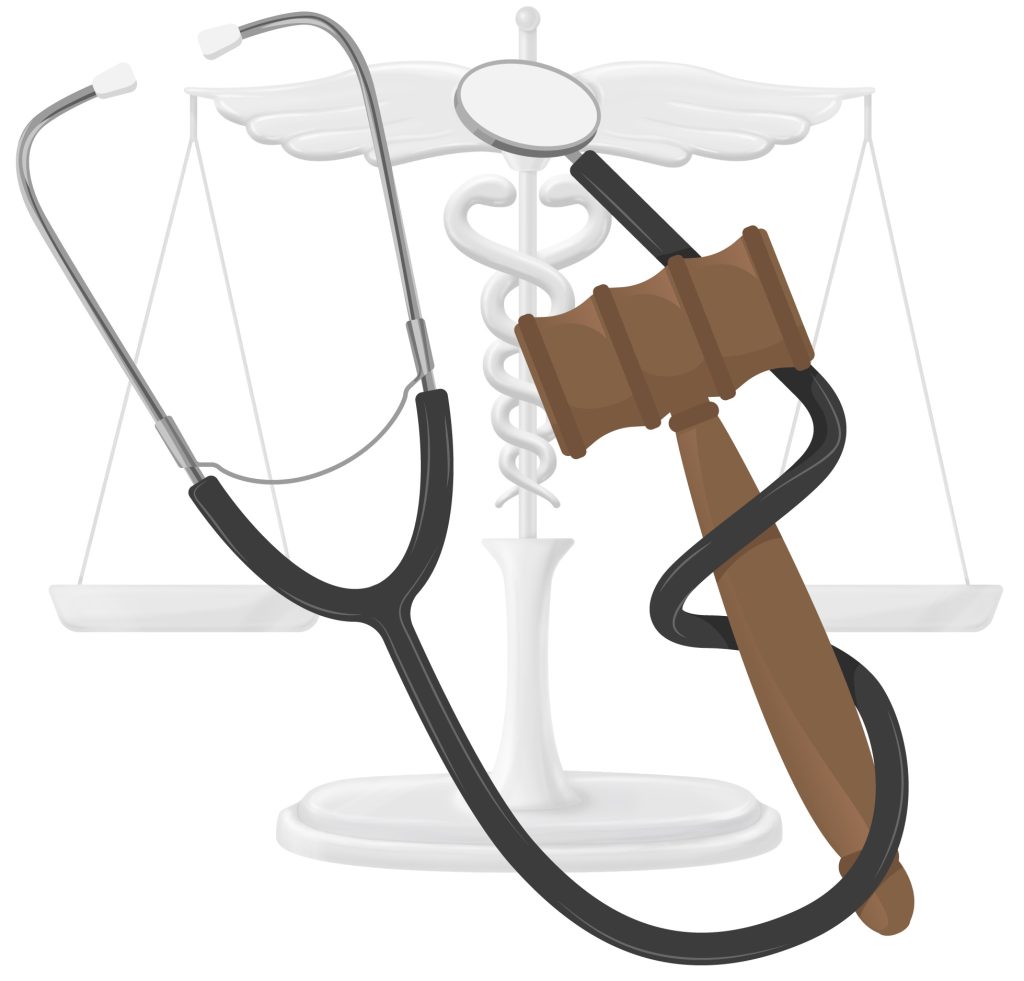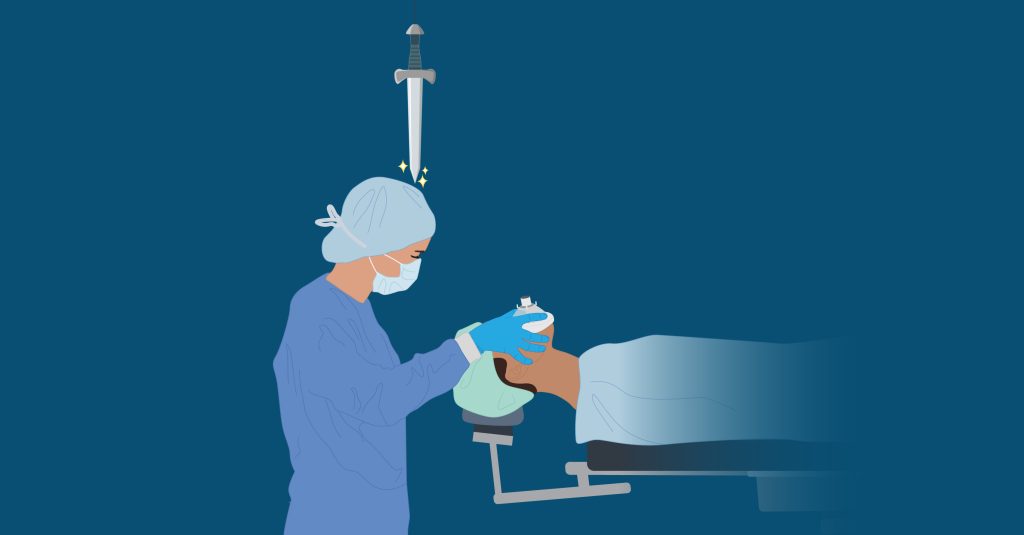Human error is inevitable, and criminalizing it can impede the transparency needed to learn from our mistakes. We discuss an example that details the importance of avoiding criminalizing medical errors and instead focusing on systemic failures that may foster an error that harms a patient. Learning from the mistakes of others, rather than punishing them, is an enlightened approach to promoting patient safety.
Table of Contents
- The case of nurse Vaught
- Anesthesia professionals as vanguards of safety
- The Sword of Damocles
- The question of criminalizing medical error
The case of nurse Vaught
With full access to drugs like digoxin, insulin, and pancuronium, nurse Charles Cullen intentionally murdered over three dozen patients, possibly as many as 400. In 2006, he was committed to prison for 18 consecutive life sentences. This was a clear example of what might be termed medical homicide.
In 2022, after a brief trial, a Vanderbilt University Medical Center (VUMC) nurse, RaDonda Vaught, was found guilty of “criminally negligent homicide and gross neglect of an impaired adult.” Unlike Cullen, nurse Vaught’s actions were unintentional.
Nurse Vaught’s conduct that led to her conviction occurred in 2017, on Christmas Eve, after Charlenne Murphey was admitted to VUMC’s neuro-ICU for a hemorrhagic stroke. In what Ms. Murphey’s family described as a Christmas miracle, her condition improved in less than 48 hours and plans were underway to discharge her pending a scheduled PET scan. Accompanying Ms. Murphey to the imaging center, an order for the anxiolytic midazolam prompted nurse Vaught to secure it from an automated dispensing cabinet. Her thoughts defaulted to “Versed,” which she entered into the search menu and, in error, retrieved vecuronium, which she administered. Ms. Murphey experienced apnea and cardiac arrest and died.
While Ms. Murphey failed to confirm, there were obvious flaws in the system, as similar, nonfatal events had occurred previously. For example, with a high-alert drug like vecuronium, a double-check system might have prevented this occurrence. It might also be asked why a paralytic drug, like vecuronium, was even available on that dispensing unit.
The transcripts of the trial reveal much about our legal system. Here are a just few of the points the aggressive prosecutor argued about Vaught:
- “She recklessly ignored her training.”
- “It was no accident or mistake as claimed… there were multiple chances for her to just pay attention.”
- “It was a criminal act of reckless homicide.”
- “The suffering of the family members dealing with this egregious act…”

The defense, equally impassioned, argued that Vaught:
- “Committed an honest mistake.”
- “It was an accident.”
- “There is debate about the vecuronium being the proximate cause of Ms. Murphey’s death.”
- Based on an expert neurologist’s testimony, the death was, “within the realm of possibility, due to a brain injury.”
It is not our intent to analyze the judicial process or the jury’s decision. Rather, we are considering a complex and compelling question: when and whether it is reasonable to view medical error as a homicide?
Anesthesia professionals as vanguards of safety
When you go into the OR or a procedure room to provide anesthesia care you are fully cognizant that you are not somehow vaccinated against punishment should you perform a criminal act. However, based on an enormous body of literature, we know that criminalizing medical errors is not useful in preventing mistakes that are unintentional or inadvertent. Words are powerful and convey a great deal of information that can evoke stunning imagery in the listener’s mind. Think of the word “reckless” as used by the prosecution involved in Ms. Murphey’s trial. The National Council of State Boards of Nursing notes that a healthcare error constitutes “recklessness” if a nurse takes a “substantial and unjustifiable risk in providing care.”
For decades, CRNAs and physician anesthesiologists have remained as vanguards in patient safety enterprises. Although we’ve heard it stated otherwise from healthcare polymaths, a 100% error-free healthcare delivery system is simply not attainable while humans are involved.
Consider the Zen proverb: The wise learn from their mistakes, but the wiser learn from the mistakes of others. One concern we have related to the Vaught case is that criminalizing unintentional error might result in those who commit or experience medical error refraining from reporting it. Candid and transparent sharing of information would likely greatly suffer.
The Dana-Farber Cancer Center in Boston, one of the nation’s leading specialized centers for research and treatment of cancers, went on record in the aftermath of the Vaught decision. Their concern, published on their website, was that the case “must never become a precedent as it would ultimately undermine the culture of patient safety and the non-punitive environment that all hospitals must model. The criminalization of medical errors has no place in healthcare.”
The Sword of Damocles
In mythology, a powerful and wealthy ruling king, Dionysius, enacted policies that produced many enemies. He was forever anxious, fearing mutiny or assassination at any moment. Damocles, a kind of court jester, tried to flatter the king with outrageous compliments of how wonderful a king’s life must be. Dionysius offered Damocles an opportunity to sit on the throne and enjoy all the luxuries of food, servants, and other associated opulence.
Seated on the throne, Damocles reveled in his extraordinary good fortune, but when he looked up, he saw a gleaming, steel sword suspended by a single horsehair that might fall at any moment onto his head. Damocles asked to be excused—he no longer wanted to be so “fortunate” as his king. The symbolic representation of living or working under constant apprehensiveness is today known as the “Sword of Damocles.” The symbolism is that something bad might happen to them at any time.
The question of criminalizing medical error
CRNAs work in an incredibly complex and often stressful environment, where we purposely administer the most dangerous drugs on planet Earth. We do learn from the mistakes of others; the systems we work in and the knowledge we access can be adjusted based on that information to advance patient safety. Open, frank, and transparent communication is critical to ensure a thriving culture of safety.
This is an ongoing process, not a one-and-done type of thing. The process becomes much more difficult should healthcare providers sense the Sword of Damocles hanging over them as they care for their patients. Mistakes in healthcare, in general, and in our specialty practice of anesthesiology, in particular, will undoubtedly occur. Fostering a blame-free, protected environment ensures timely and valuable information for providers to promote patient and team safety.
Whatever your view about the Vaught case, we wonder if a formal judicial process was the ideal way for it to work. Couldn’t it have been managed differently for the benefit of all?








